Sorted by date Results 1 - 23 of 23
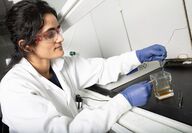
Georgia Tech researchers forge copper-infused, nanotextured stainless-steel material to stem rising tide of deadly infections. Researchers at Georgia Institute of Technology have created a stainless-steel alloy infused with copper to prevent bacterial infections caused by surface contamination. The new metal has potential to be used to create an effective, scalable, and sustainable solution to the growing threat of deadly antibiotic-resistant microbes adhering to surfaces in...

While the importance of rare earth metals is widely acknowledged in manufacturing sophisticated devices for use in space, defense, clean, green and consumer technologies, the increasingly innovative and effective roles REE are playing in the development of new medicines and medical technologies get little public attention. New developments in medical technology are expected to increase the use of surgical lasers, magnetic resonance imaging, and positron emission tomography...
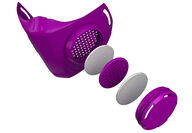
Copper3D, a Chile-based tech start-up, is harnessing the power of copper, 3D printing and an open-source design to help ensure there are enough face masks to go around during the COVID-19 pandemic. Working under the hashtag, "hack the pandemic," this innovation company has designed a N95 mask – a close-fitting respiratory device that filters at least 95% of very small particles – that can be printed with a patented material that has nano-copper additive that works as an ant...
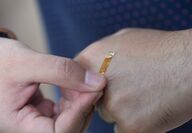
Researchers at The University of Queensland's Australian Institute for Bioengineering and Nanotechnology in Brisbane have developed a small sensor made from gold film that is both flexible and sensitive enough to enable a more streamlined future for electronic medical implants and real-time sensing applications. Principle investigators, Mostafa Kamal Masud, Ph.D., and Ph.D. candidate Aditya Ashok, used a new engineering approach that represents a breakthrough in the field of...
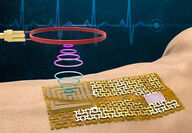
MIT develops a wearable sensor able to target any biomarker Using a gold-gallium "band-aid" could prove the next generation of biological monitoring as researchers from the Massachusetts Institute of Technology have devised a new kind of wearable sensor capable of communicating wirelessly without the need for microchips or even batteries. Wearable sensors are ubiquitous due to wireless technology, which enables the monitoring of glucose concentrations, blood pressure, heart...
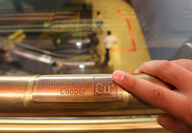
A team of University of British Columbia researchers has designed a new copper coating that can kill bacteria more quickly and in greater quantities than current chemistries and could soon be available for hospitals and other high-traffic facilities. The group, led by Amanda Clifford, an assistant professor in the department of materials engineering, has designed a nano-copper coating that includes bacteria-killing nanoscale features and zinc. Although current formulations...

The application of antimicrobial copper patches on high-touch surfaces at the University of British Columbia Faculty of Applied Science will help reduce the spread of infection as researchers inside the protected buildings investigate more advanced copper coatings that are even more lethal to viruses and bacteria. Funded through Teck Resources Ltd.'s Copper and Health program, more than 400 Health Canada-registered copper patches have been installed on door handles, railings,...
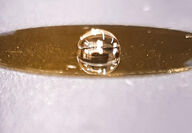
In further investigation into the natural antimicrobial properties of copper, researchers at the University of Waterloo, Ontario, have discovered that using a thin-film coating of copper or copper compounds can enhance the metals' natural ability to inactivate or destroy bacteria and viruses, including the SARS-CoV-2 virus responsible for COVID-19, by saturating contamination with nano-copper. In a study that began soon after the pandemic hit in March 2020, University of...

Scientists in Australia have developed a copper material that kills deadly bacteria two minutes after contact and could prove effective in destroying SARS-COV-2, the virus that causes COVID-19. A team from RMIT University in Melbourne, Australia, working in collaboration with CSIRO, the science research agency of the Australia government, reported in the January 2022 edition of the scientific journal, "Biomaterials," that the copper innovation kills bacteria more than 100...
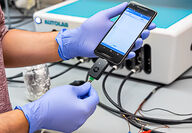
The furious pace of scientific and academic research into ways to curb the spread of COVID-19 and other highly infectious diseases is yielding impressive results this summer. Researchers say testing is key to understanding and controlling the spread of COVID-19, which has already taken more than four million lives around the world. However, current tests are limited by the tradeoff between accuracy and the time it takes to analyze a sample. Another challenge of current COVID...

From Ebola outbreaks in Africa to illnesses picked up at the local hospital or clinic, finding a highly effective and efficient means of fighting infectious disease has been a priority for healthcare workers long before the coronavirus known as COVID-19 emerged from a seafood market in Wuhan, China, and rapidly spread around the world. Frustrated by the lack of affordable antimicrobial products for use in healthcare facilities, Dr. Alfred Mitchell began investigating the...

Coating high-touch public transit surfaces with a layer of copper is a highly effective way to kill bacteria on busses, subways, trains, and other metropolitan transport, according to the results from a five-week pilot carried out on TransLink busses and SkyTrain cars in Vancouver, British Columbia. Funded by Teck Resources Ltd., a Vancouver-based mining company, the copper-surface pilot is a first of its kind in North America. Based on sample-testing, the trial concludes...
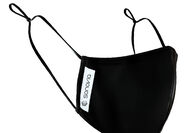
Among a growing number of facial masks infused with minerals that innovators around the globe have brought to the market in recent months to help stop the spread of the coronavirus infection, SonoMask is one touted by its makers as being the only mask proven to neutralize the virus and provide nearly 100% protection. Engineered by an Israeli company, Sonovia Ltd., the mask resulted from researchers applying antimicrobial technology developed in 2013 to produce a reusable face...
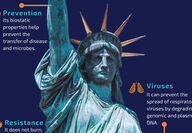
4 was a year many will not forget, from the onset of COVID-19 in the spring, to the subsequent economic instability left in its wake. A silver lining to this challenging year, however, may be the innovations and inventions developed to combat the contagion and bring certainty back into people's lives. Turning to relatively unexplored technologies and chemistries, companies sought the natural antimicrobial powers of "medical" metals and minerals such as the natural...

A fresh coat of Copper Armor, an antimicrobial paint developed by Corning Inc. and PPG, could transform surfaces at high-risk for the spread of COVID-19 into self-sanitizing areas that are deadly to bacteria and viruses. Leveraging the glass and ceramic expertise that makes its kitchenware a staple in homes around the globe, Corning has developed a copper infused glass matrix that is a highly effective and continuous killer of germs, including the virus that causes COVID-19....

Continuing its initiative to bring copper to the frontlines in the urgent fight against the spread of bacteria and viruses such as COVID-19, Teck Resources Ltd. announced the expansion of its Copper and Health program to Chile, partnering with leading national health professionals and academics on a pilot project at the Iquique Hospital. Research has shown that copper alloy surfaces are naturally antimicrobial and are imbued with self-sanitizing properties, with up to 99.9%...

Researchers in a Swiss laboratory have developed a membrane made of titanium oxide nanowires with antibacterial and antiviral properties. The membrane, which resembles filter paper, may be used in the fight to curtail the COVID-19 pandemic more effectively than paper masks, which are increasingly becoming made mandatory, according to scientists at Ecole Polytechnique Federale de Lausanne in Lausanne, Switzerland. While the relative effectiveness of paper masks is no longer in...

Since the outbreak of COVID-19, ultraviolet light has emerged as a popular way to kill novel coronavirus without the use of harsh chemicals. While research has shown that UV light is an effective destroyer of viruses and bacteria, the devices that emit a strong enough dose to get the job done tend to be bulky and expensive. "You have to ensure a sufficient UV light dose to kill all the viruses," said Roman Engel-Herbert, Penn State associate professor of materials science,...

Zen Graphene Solutions is collaborating with Graphene Composites Ltd. to develop a COVID-19 killing virucidal graphene-based composite ink that can be applied to fabrics, including N95 face masks and other personal protective equipment. Graphene Composites, a United Kingdom-based company with offices in the U.S, specializes in the technology of nanomaterials. Focusing on the usage of graphene and other distinctive materials, such as aerogels, they produce a range of products...

Vale, a Brazil-based mining company with operations in Canada and around the globe, is challenging innovators to come up with solutions to minimize the societal impacts of COVID-19 and is offering US$1 million to get those innovations deployed to those who need them as quickly as possible. "Around the globe, industries and individuals alike are working diligently to find innovative solutions to combat this invisible enemy," said Vale North Atlantic Operations and Asian Refiner...

Can zinc lozenges and syrups galvanize our bodies' defenses against COVID-19? Research and clinical trials have demonstrated its ability to lessen the severity and duration of similar severe acute respiratory (SARS) coronaviruses and would likely help your body put up a stronger fight against this latest strain. Inside your body, zinc galvanizes your immune system on two fronts – it has natural antimicrobial properties and it boosts the white blood cells that fight off coronav...

The strongest and most conductive material known to man, graphene is considered a miracle material that will likely change how we construct things in the 21st century – from micro-electronics to mega-building structures. But, can this single layer of super strong carbon atoms also protect us from the spread of diseases like COVID-19? GrapheneCA, a New York-based producer of graphene and developer of technologies that use this miraculous allotrope of carbon, believes the a...

In recent years, Teck Resources Ltd. has been working with healthcare officials around the world to bring copper to the frontlines in the urgent fight against bacteria and viruses harmful to the human body. Now Teck, one of the world's top copper producers, has joined the battle underway to curb the spread of the deadly COVID-19 pandemic by moving outside the healthcare field with a new pilot project in Vancouver that is using the red metal's formidable antimicrobial...